Antivirus software is a necessary tool in today’s online world. Attacks are only becoming more sophisticated, especially with the aid of AI. Even the tech-savvy and cautious can drop their guard at the wrong time or get tricked into exposing themselves to malware, spyware, or ransomware. Antivirus protection is an essential backup against such threats.
Most systems come with security software baked into the OS, but for some folks, an upgrade can help demystify and simplify online security. To help you choose a good suite, we’ve identified products that offer excellent protection, worthwhile features, and minimal performance impact on your PC.
Why you should trust us: PCWorld has been deep in the trenches of testing computer hardware, software, and services since 1983—including security suites. For antivirus apps, we continually evaluate popular or noteworthy software. We consider the user experience, strength of protection against threats (online and offline), and how well it addresses the ever-expanding types of attacks. Our guide on how we test antivirus software at PCWorld gives the full details of our review process, but for the results of our work, read on.
Update November 25, 2024: We’ve refreshed our antivirus reviews with the latest benchmarking data from security organizations. You can also catch up on some positive security news—additional security features may be coming to Gmail and Microsoft Edge, which should lessen the burden on us ordinary folk.
Best antivirus of 2024 reviewed and ranked
Norton 360 Deluxe – Best antivirus for PC overall
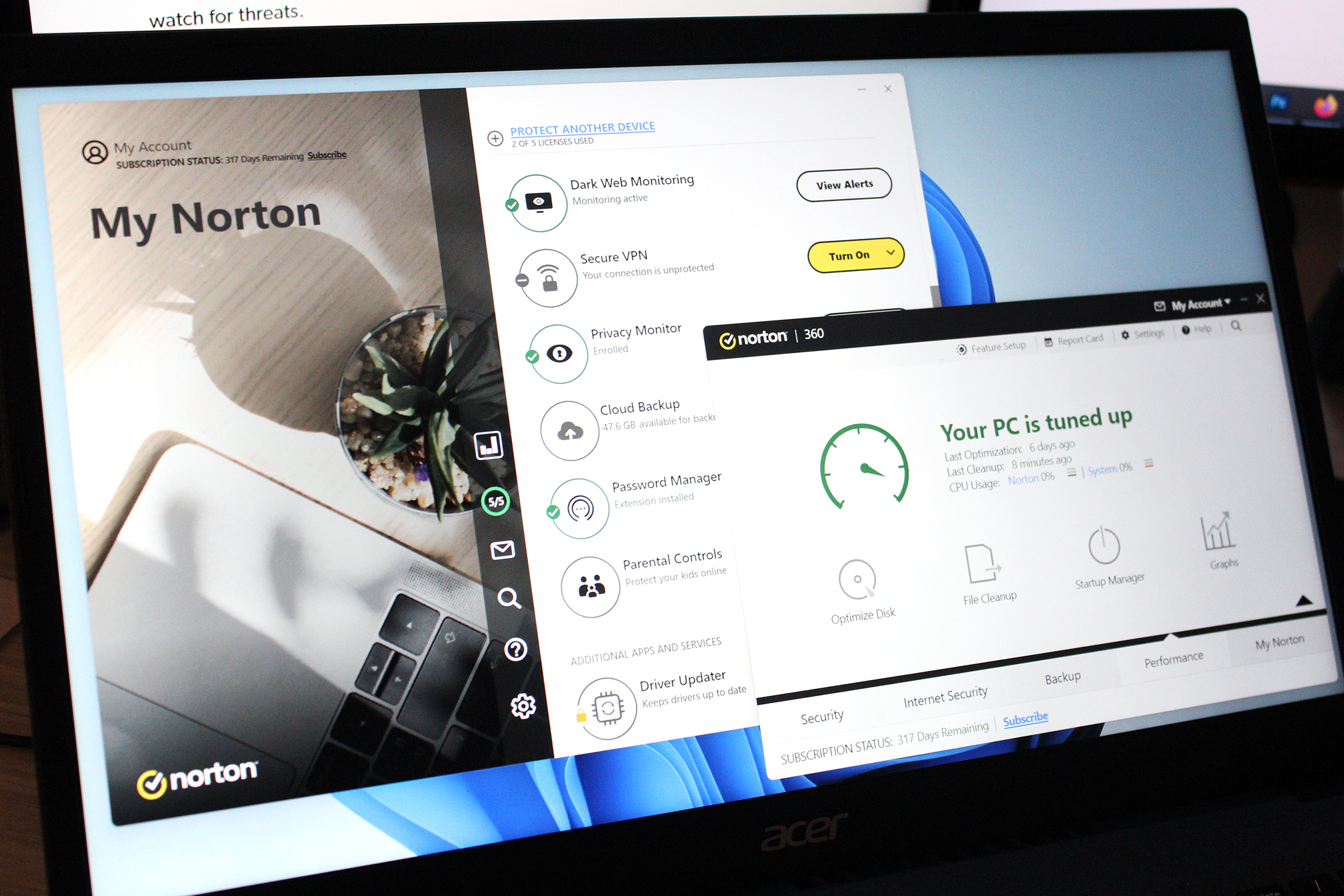
Pros
- Strong antivirus protection
- Wide protection against major online threats
- Simple, straightforward features
Cons
- Performance impact on some PCs
- User interface would benefit from consolidation
- Upselling of additional services
Price When Reviewed:
$49.99 for the first year
Why we picked Norton 360 Deluxe
An ideal antivirus suite packs in a little of everything needed for security without costing a ton—and that’s why our pick for the best antivirus software of 2024 is still Norton 360 Deluxe. Despite its slightly awkward interface, this software’s wide protection and affordable pricing is ideal for most users.
This plan has just about everything most PC users need, without extra bloat. For antivirus performance, Norton offers strong online protection, while having minimal impact on system resources if you don’t often download or copy large amounts of files. Additionally, you get malicious link and attachment screening, dark web and privacy monitoring, and webcam safeguards. Norton also tosses in 50GB of storage for cloud backups, access to Norton’s password manager and VPN, parental controls, and PC utilities that include the ability to monitor for outdated software. And those major extras—the password manager, VPN, and parental controls—have easy, simple interfaces, without feeling stripped to the bone.
Overall, Norton is an excellent option for those looking to consolidate their online security protections into a single software interface. It has a couple of quirks (namely a dual user interface that can mildly slow navigation), but its strengths far outshine its weaknesses, especially when it packs in so much value. You’ll pay $50 for the first year for 5 devices, and $120 per year thereafter.
Who should use Norton 360 Deluxe
Norton 360 Deluxe works for everyone—it consolidates all the biggest protections you need online into one package, including parental controls. If you have trouble keeping up with security experts’ recommendations (or haven’t yet gotten around to following all of them), this suite centralizes and simplifies it all.
Read our full
Norton 360 Deluxe review
Avast One – Best overall runner-up
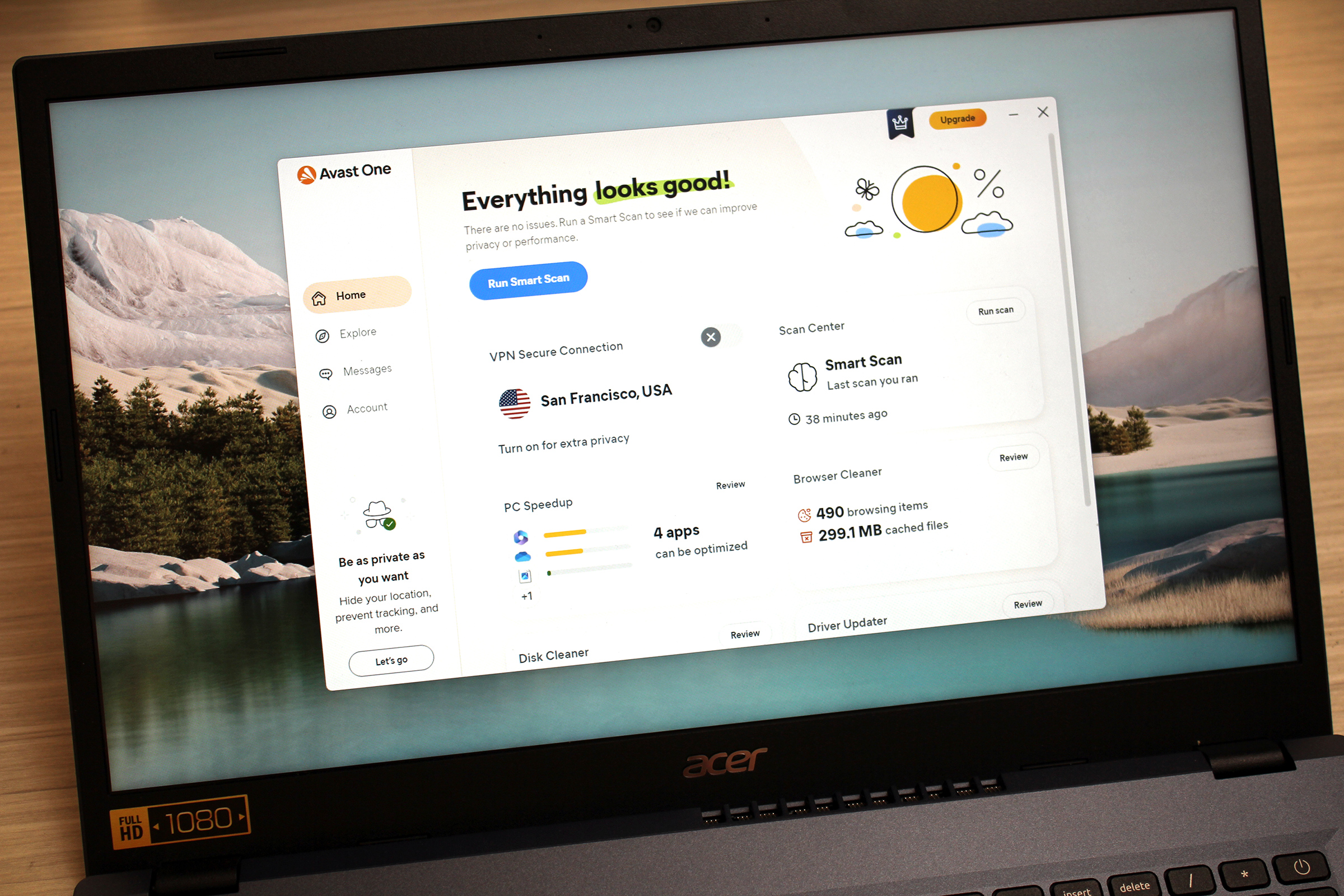
Pros
- Good new design
- Well priced
- Excellent performance
Cons
- Smart scan requires too much user intervention
- Avast asks to install Google Chrome
Price When Reviewed:
$53.88 / 5 devices I $83.88 / 30 devices
Why we picked Avast One
Avast not only offers solid protection, but a simple, friendly interface. Combine that together with useful extra features and multi-device coverage, and you have a winning combo in Avast One.
In addition to top-ranked antivirus protection, it offers safeguards against remote webcam takeovers, malicious websites, and trackers. The Avast One plan also includes dark web monitoring, a VPN with up to 5GB of bandwidth per week, and protections for saved passwords to a browser. You get utilities to help you keep your PC’s drivers up to date, clean up your PC, and optimize your apps, too.
These features may sound standard, and to be fair, many of them can be found in rival software. But Avast makes staying on top of security dead simple, whether you’re a novice or a security veteran. Its default settings require little input to keep your PC protected, and if you want to dig in further or tinker, you still have that option, too.
So what keeps Avast out of the top spot, when its software outperforms Norton’s? The amount of features for its price. Norton’s performance isn’t perfect, but it’s about as good for online protection, which is where it counts. And the two software plans cost about the same—Avast One is $51 for 5 devices (or $70 for up to 30 devices) during the first year. The cost rises to $110 and $150, respectively, per year afterward. In the end, the more well-rounded subscription wins out.
Who should use Avast One
You’re someone who has a password manager already set up, don’t need parental controls, and prioritize the highest marks in threat detection tests. Avast One lacks the first two features, and takes top marks for catching both online and offline risks.
Read our full
Avast One review
AVG Internet Security – Best budget antivirus suite
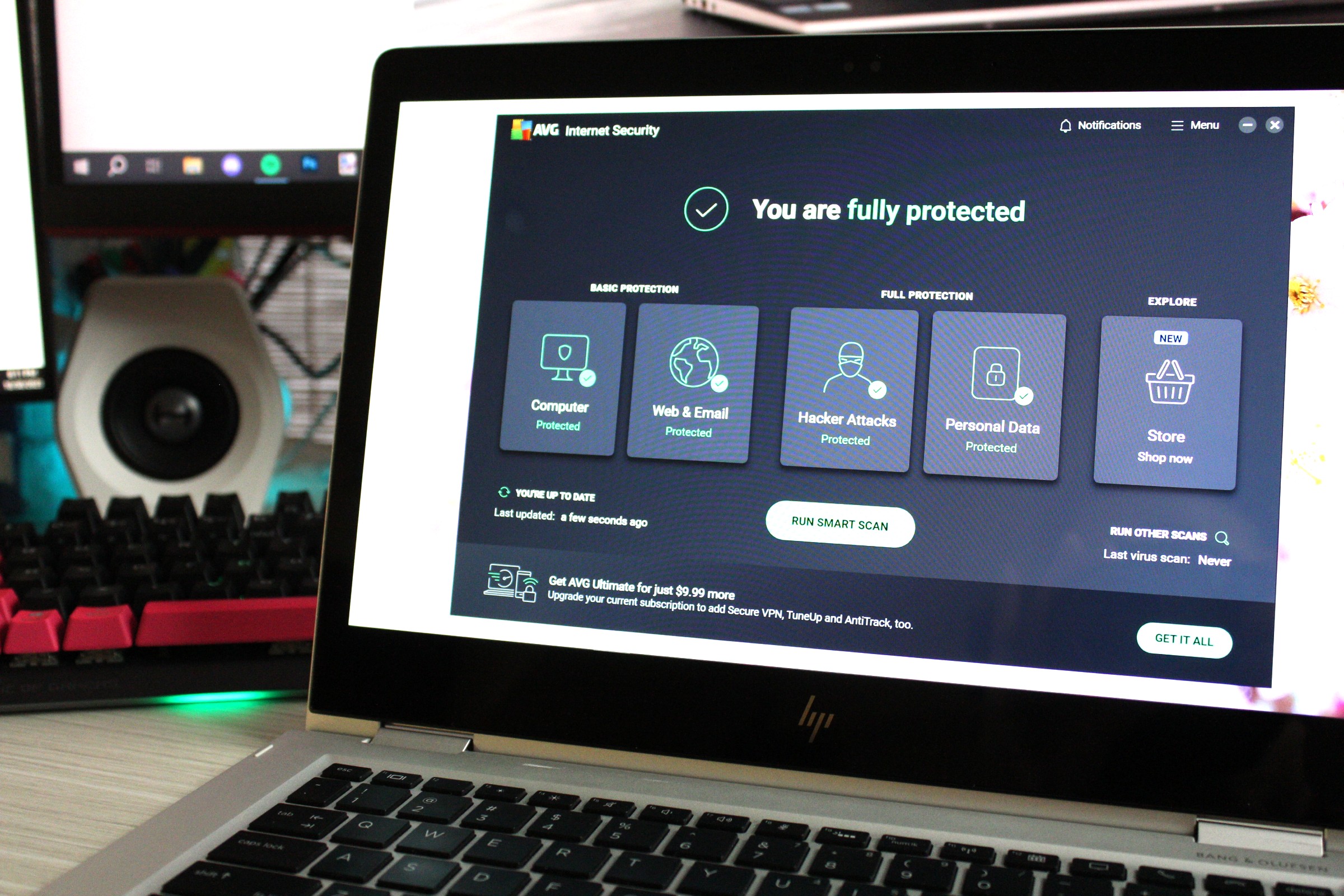
Pros
- Top-rated antivirus protection
- Expanded protection against malicious websites and remote attacks
- Clean, straightforward interface
Cons
- Some PCs may experience a performance hit during heavier workloads
- Several features are a bit rudimentary
Price When Reviewed:
$59.88 first year (10 devices)
Why we picked AVG Internet Security
AVG is best known for its excellent free antivirus software, but there’s good reason to upgrade. AVG Internet Security not only offers more comprehensive protection, but also easy management of those tools. That can be valuable if you find keeping up with online threats too overwhelming or time consuming.
The Internet Security plan builds upon the free version’s top-ranked protection against malware and web, email, and network threats. It also guards the passwords saved to your browsers; webcam takeovers; unknown access to files with sensitive data; malicious redirects for websites you’re trying to visit (aka DNS hijacking); and Windows Remote Desktop attacks. Dark web monitoring is included as well. And the app has minimal impact on system resources when monitoring your system in the background, though full scans can hit budget or older systems harder.
Despite its small annoyances, AVG Internet Security is reliable antivirus software with a user friendly interface—and at just $60 during the first year for 10 devices, it’s affordable, too. In fact, it’s solid enough to earn a recommendation despite how strong the free version is on its own.
Who should use AVG Internet Security
You need deeper control and more expansive protection from your antivirus software, but you don’t want to pay extra for features you don’t want. AVG Internet Security expands just enough on the company’s free antivirus to make it worthwhile, even though it lacks elements like parental controls, VPN, and a password manager.
Read our full
AVG Internet Security review
Avira Prime – Best antivirus for beginners
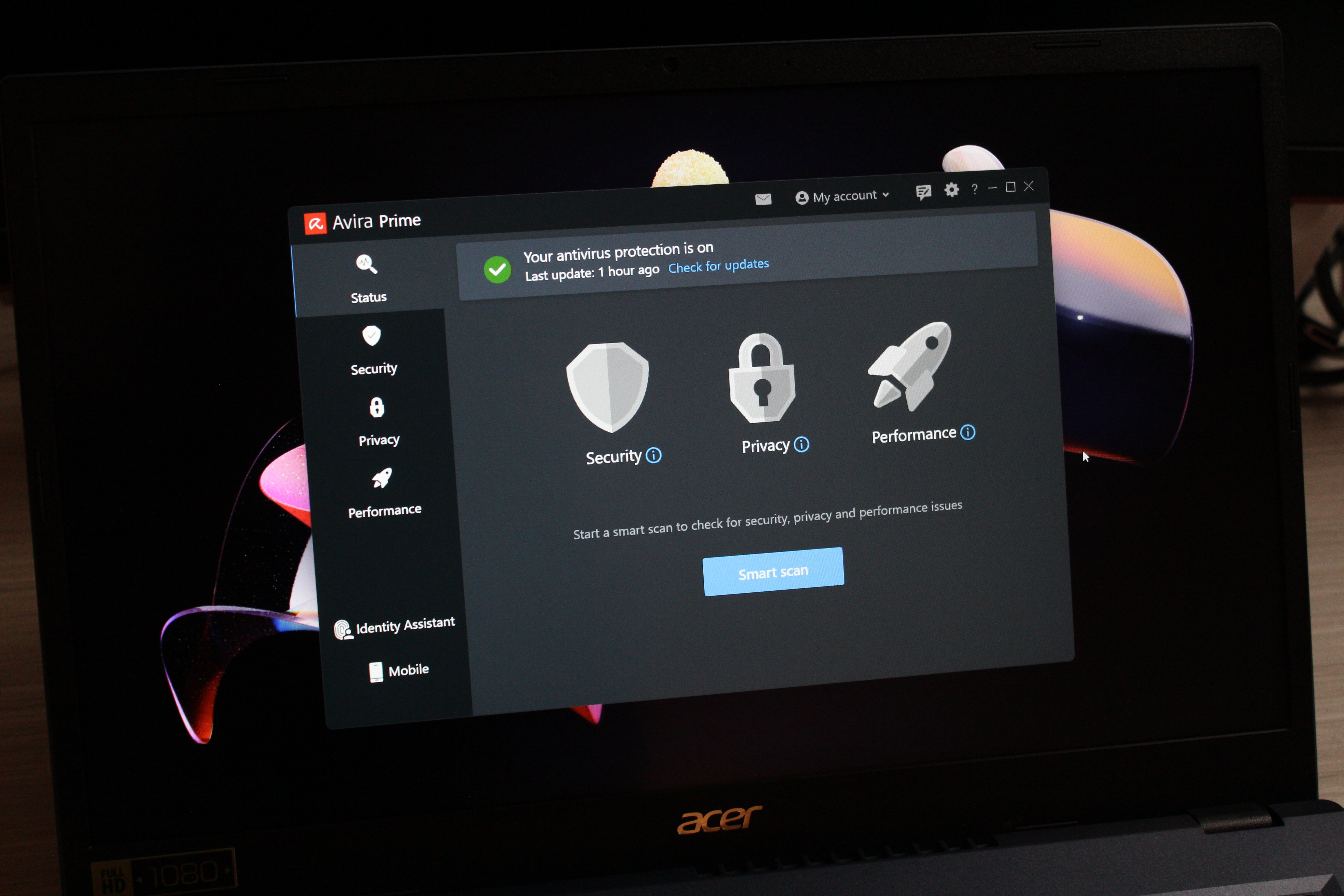
Pros
- Strong security with a reasonable subscription price
- Well designed and user-friendly
- Offers a host of features in the areas of security, privacy, and performance
Cons
- No subscription option for fewer than five devices
- Simplicity of app feels slightly at odds with the depth of the PC tools
Price When Reviewed:
5 devices: $9.99/mo I $59.99/yr I $204.99/2yrs
Why we picked Avira Prime
Avira Prime is one of the best choices for those seeking more help with managing their PC, thanks to its simple, clear interface and feature lineup. In addition to to solid antivirus protection, it offers a password manager, unlimited VPN, and a boatload of PC utilities that (among other things) can keep apps up to date, securely delete files, and back up data.
The one major feature missing from Avira Prime is a set of parental controls. You can’t use it to filter web content or monitor device usage. It also can hit older and budget PCs hard when full scans are running, if you’ve added or changed large amounts of files. But typically, it only minimally affects system performance when left to run in the background, so most people won’t notice Avira running.
For those who want the comprehensive simplicity that this security suite offers, you’ll pay $60 for the first year, and then $105 for every year after. That first-year cost is slightly higher than our overall top pick, but if you prefer more newbie-friendly software, it’s worth the extra ten bucks.
Who should use Avira Prime
Avira Prime will likely feel best to users who want a simple antivirus suite, broad online protections, and robust PC utilities—and also want to use those latter tools for more confident management of their computer. Not every utility is a winner, but the overall set can help you identify and understand the more technical aspects of Windows and system upkeep. Parents will need to look elsewhere for controls that let them monitor and limit their kids’ PC use, however.
McAfee Total Protection – Best for privacy
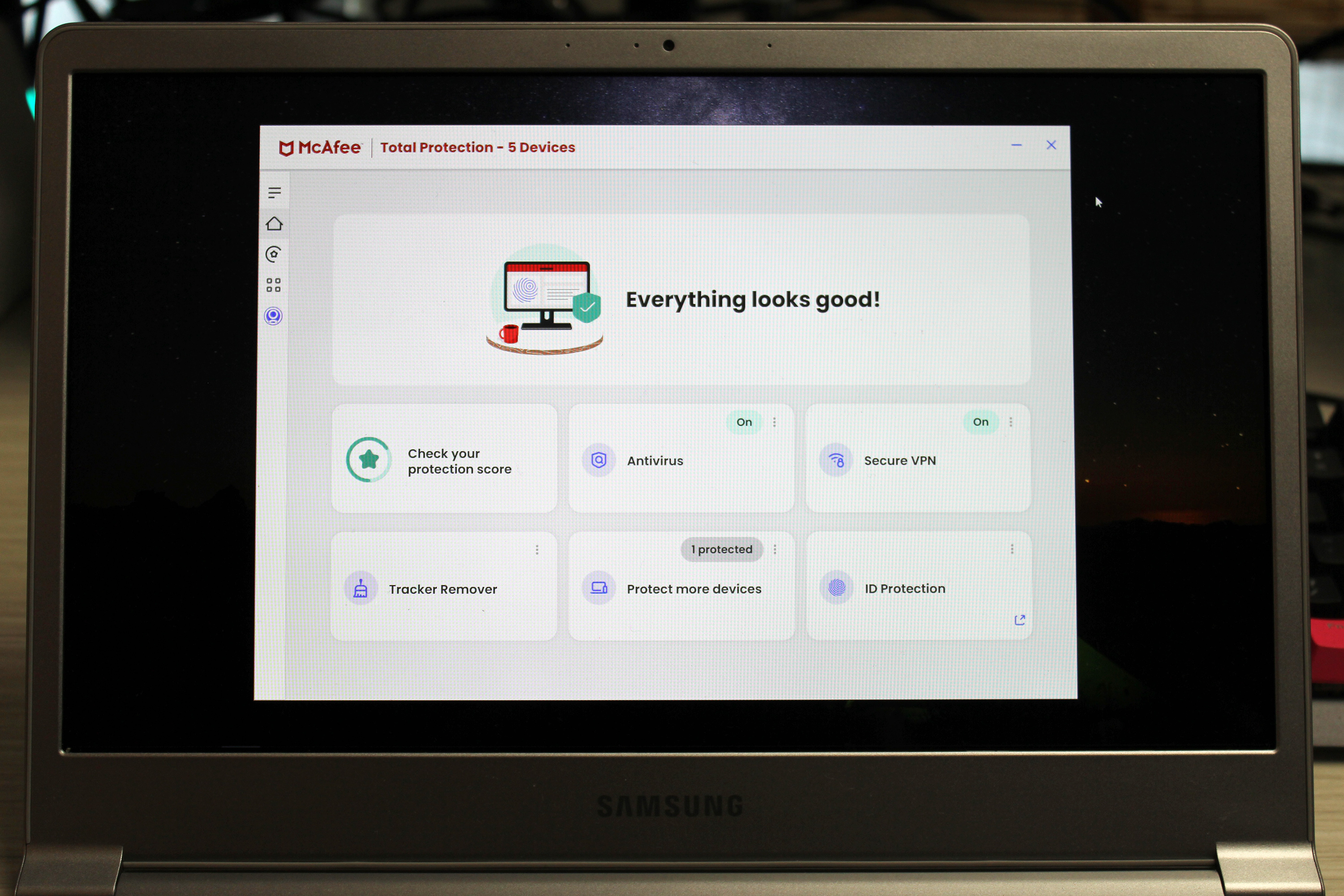
Pros
- Good protection
- Nice features like file shredder and home network analyzer
Cons
- Mixed impact on performance
- New app design is a little scattered
Price When Reviewed:
Single: $29.99 (1 device) for first year, then $89.99 Essential: $24.99 (5 devices) for first year, then $119.99 a year
Why we picked McAfee Total Protection
McAfee has been around a long time—and the company continues to hunt down current threats to PCs, with solid results. These days, dangers extend beyond just malware to identity and privacy issues, and McAfee Total Protection addresses these just as much as it does ransomware and phishing sites.
That ID protection makes it stand out against competitors, especially if you pay to scale up the service. The plan we tested included dark web scanning for multiple pieces of personal information (email address, phone number, social security number, passport, driver’s license, date of birth, tax ID, credit card, usernames, and more). The app also offers to help change your password for online accounts, when applicable. VPN access is included as well.
Mid-tier and budget machines can see impact on system resources when running McAfee scans. When we ran a full scan during a variety of common tasks (web browsing, document editing, etc), we noticed some dips in performance. You can mitigate this effect by timing scans for off hours, however.
Currently, McAfee Total Protection is available through third-party sellers (McAfee has turned its attention to its slightly newer McAfee+ plans on its website). We like this version still because of how deeply affordable it is—for example, a license on PCWorld’s own software site is just $19 per year, which covers up to ten devices for one year.
Who should use McAfee Total Protection
Your personal information can be used against you online—and with data breaches so painfully common these days, it can be a relief to have help in tracking who has your info. For anyone who doesn’t have as much time to handle that work themselves, or even keep track of a separate service, McAfee can serve as a central spot for managing all your online security concerns.
Panda Dome Complete – Most feature-rich offering
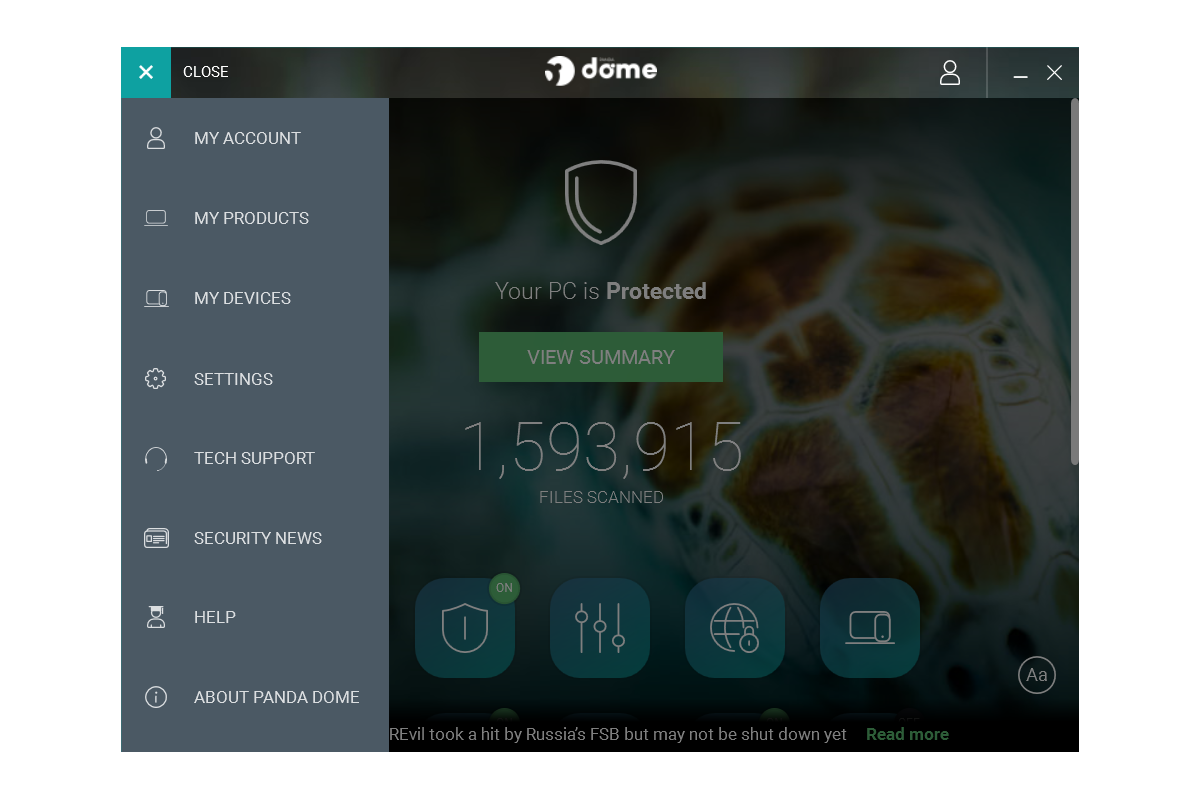
Pros
- Very easy-to-understand mobile-like interface
- Contains some basic smart home network monitoring
- Month-to-month pricing option
Cons
- Good performance results but currently limited in third-party testing
Price When Reviewed:
1 device: $58.49 I 3 devices: $64.99 I 5 devices: $71.49 I 10 devices: $110.49
Why we picked Panda Dome Complete
All deluxe antivirus suites offer extra tools as part of their package, but Panda Dome Complete particularly stands out. It also has one of the most striking interfaces we’ve seen. Similar to Microsoft’s Bing homepage, Panda Dome features a beautiful background photo, with the interface elements placed on top of it.
A whole raft of utilities come with this suite, including a virtual keyboard, advanced virus removal, an update manager for your Windows apps, a disk defragmenter, hard drive cleaner, and startup apps manager. You also get Wi-Fi protection (which lets you see what devices are connected to your network), a password manager, parental controls, and a VPN that offers 150 megabytes of bandwidth per day.
In addition to offering reliable antivirus protection, Panda had the most minimal impact on system performance during our benchmarks. So minor, in fact, that in the real-world it worked out to no difference.
As one of the most feature-rich offerings, Panda Dome Complete also one of the most expensive, too. You can purchase a subscription for $64.50 during the first year ($86 per year afterward), but that’s covers just one device. Fortunately, it only costs a little more to upgrade to a three device plan ($72 for the first year, $96 per year afterward) or five device plan ($79 for the first year, $105 per year afterward).
Who should use Panda Dome Complete
Panda Dome Complete puts a ton of features right at your fingertips—an ideal interface for those who want to dive into everything straight away. If you hate buried or oversimplified menus, you’ll feel right at home with this software.
Read our full
Panda Dome Complete review
Windows Security – Best free antivirus

Pros
- Built into Windows 10 and 11
- Settings are easy to review and customize
- Integrates with other security aspects of Windows
Cons
- Tends toward false positives, especially with SmartScreen
- Lacks the advanced features found in third-party products
Price When Reviewed:
Included with Windows 10 and 11
Why we picked Windows Security
Windows’ built-in security suite is an excellent free antivirus option—as we discovered in our roundup of the best free antivirus—even if its protection isn’t quite as strong as third-party rivals when your PC is offline. It bundles together Defender, which monitors for viruses and malware; Firewall, which blocks malicious incoming traffic and suspicious outgoing traffic; ransomware protections (including controlled access to folders, as well as data recovery via OneDrive integration); app restrictions; and even basic parental controls.
The most important of these protections are automatically enabled in Windows—you don’t have to lift a finger to get real-time antivirus scanning or network protection. You will have to manually switch on some features, though, including ransomware folder controls and file recovery.
You can find more features in other antivirus suites, like online privacy tools, a VPN, and encrypted cloud backups. But this free protection comes preinstalled on Windows machines and does a good job of keeping you protected from most threats.
Who should use Windows Security
You’re looking for lightweight, unobtrusive antivirus protection—and don’t mind configuring it, nor managing separate security tools to make sure you’re properly protected online. To get the most out of it, you must tinker with Windows Security’s settings. (You can learn more in our video on How to use Windows Security.) You also have to figure out your own online privacy tools, VPN, password manager, and encrypted cloud backup.
Read our full
Windows Security review
Intego Mac Internet Security X9 – Best antivirus for Mac
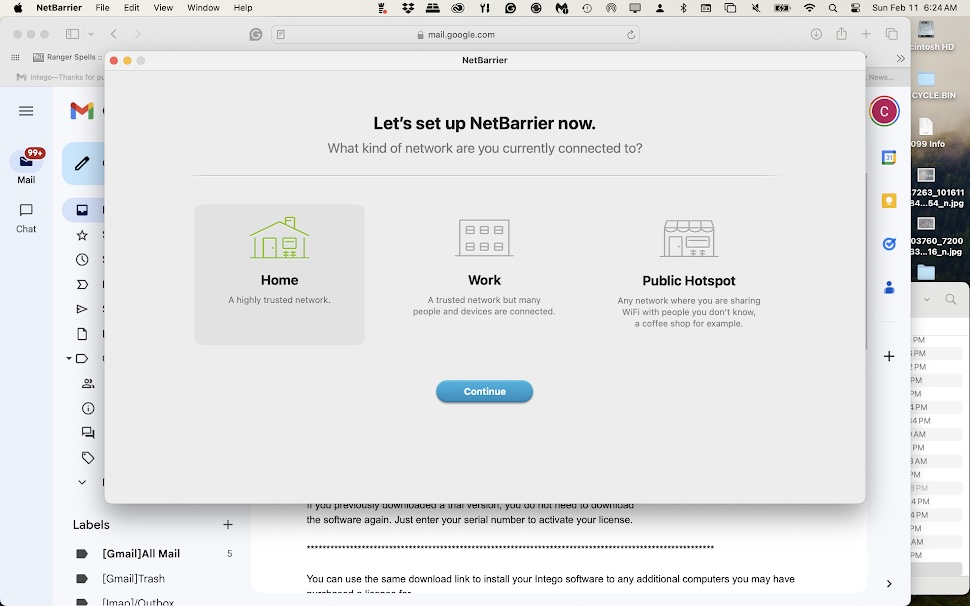
Pros
- Two-way firewall
- Good performance
Cons
- Mac-specific (no Windows / Android protection)
Price When Reviewed:
From $24.99 for first year, then $49.99 a year (1 Mac) Using our link
Why we picked Intego X9
As the headline reveals, the focus of this roundup is the best antivirus for Windows PCs, but many PC enthusiasts are the de facto IT for friends and family. If you want to help an associate or loved one achieve strong antivirus protection for an Apple machine, our colleagues at Macworld recommend Intego’s Mac Internet Security X9.
In the suite are two utilities. The better known one is VirusBarrier, which spots and eliminates malware threats, and gets strong ratings for its protective abilities. It comes paired with NetBarrier, a two-way firewall that watches for suspicious traffic going to or from your Mac. For the price of this suite, NetBarrier’s inclusion isn’t common, but definitely welcome.
As part of its protection, VirusBarrier X9 scans for threats on your Mac’s internal storage drive (including any downloaded email and compressed archives), as well as connected disks and iOS devices. The app quarantines suspicious files, which you can then mark as trusted, leave in quarantine, or try to have repaired.
Overall, Intego’s Mac Internet Security X9 offers good compatibility with macOS while looking like a real Mac program, too. It costs just $25 (or £20.00) for the first year using this special Macworld link. If you need additional tools, like a backup utility, speed optimizer for your Mac, or parental controls, you can upgrade to the Mac Premium Bundle X9 for $40 for the first year (£23.99).
Who should use Intego X9
Intego VirusBarrier not only offers good compatibility with macOS, but it also looks like a real Mac program, too—making it an ideal match for anyone looking for an effective app that blends in seamlessly.
Recent antivirus reviews
- AVG Internet Security: A clean, straightforward interface, additional online protections, and top-notch antivirus protection make this affordable suite a perfect choice for budget-conscious users.
- McAfee+ Ultimate: This comprehensive all-in-one package offers strong antivirus protection and a vast array of online protections, but its apps, services, and tools could use more polish. Its scans also can tangibly decrease performance on mid-range and budget PCs.
- Avast Premium Security: You can choose a couple of different paths when upgrading from Avast’s already excellent free antivirus software—and this branch of the company’s software leans hard into safeguarding your PC. However, a couple of buggy features keep this suite from standing out among its rivals.
- Bitdefender Total Security: Superb antivirus defenses are packed into an easy-to-use app that includes a unique safe payment environment. However, it lacks some features you get with similarly priced suites, like a password manager.
- McAfee Total Protection: You can rely on McAfee Total Protection for blocking online threats and its easy-to-use VPN, but not its password manager. The app can also notably affect system performance on mid-range and budget PCs. Currently, the competition outdoes this entry-level offering.
- Norton 360 Deluxe: Norton 360 Deluxe has a wide array of protections spanning antivirus, password management, VPN access, automated cloud backups, and dark web monitoring. It can hit PC performance a bit harder on older or budget systems, but its overall value and solid results in AV-Test and AV-Comparatives’ benchmarks make it worthwhile.
- Malwarebytes Premium Security: Technology newbies will like this antivirus software’s simplicity, but you can get more bang for your buck elsewhere.
- Norton Antivirus Plus: Its one-device limitation is tight, but this simplified antivirus suite is affordable and offers more features than similar rivals. If you can work comfortably with its quirks and potentially heavy performance effect, it can be ideal software for digital minimalists.
- Trend Micro Maximum Security: Even when you can count on Trend Micro Maximum Security to work, this beginner-friendly antivirus suite feels underbaked. You can find much stronger malware protection, along with a more robust set of features, in rival software—and often at a lower price.
- Avast One: This upgrade on Avast’s free security suite adds protection against identity and privacy threats, along with PC tools, all while still keeping its polished interface. And in AV-Test and AV-Comparatives’ latest benchmark data, it generally led the competition in blocking online and offline threats.
How to choose the best antivirus software
There are three basic requirements that an antivirus suite should meet:
- High-detection rate for malware and other threats
- Low impact on system resources
- An easy-to-use interface
That’s not all to consider, however. A lot has changed since the early days of antivirus software. These days, many security suites come with extras such as a backup service for your most essential files, Android and iOS apps for mobile security, a more advanced firewall, family protection (read: child restriction) features, and the right to use the program on multiple PCs. Access to a VPN and a password manager have become more common, too. Whether you need those extras depends on how much you’re willing to spend and your personal situation.
If you’re looking to go beyond the basics, our baseline recommendation is to find a suite that comes with a firewall, supports enough devices to cover what you own, and (if you don’t already have separate services set up) access to a password manager and VPN. Not sure if you need all that? Our guides on security suite features, password managers, and VPNs can help you decide.
How we test antivirus software
Our approach to testing antivirus software is multi-pronged—we look not just at how well the suite catches malware and other threats (though that’s certainly a top factor), but other elements as well.
First, we take a look at the interface to determine how easy or complicated it is. Does the interface make it easy to get at essential tools like PC scans and password managers, for example, or is everything buried under multiple clicks? Are there elements that look like they should be clickable but aren’t? Are alerts interactive or purely informational, and do they make sense in context?
We also examine the features on offer. Every good antivirus suite should have the basics like scanning and real-time protection, but many vendors offer elements that go beyond basic security like password managers or firewalls. We try to discern whether any of these extra features are particularly useful, or just frills that look nice but don’t serve a practical purpose.
To test the suite’s demand on system resources, we run three benchmarks. The first is PCMark 10’s Extended test, which simulates a variety of workloads including editing spreadsheets, browsing the web, running video chat, and light gaming.
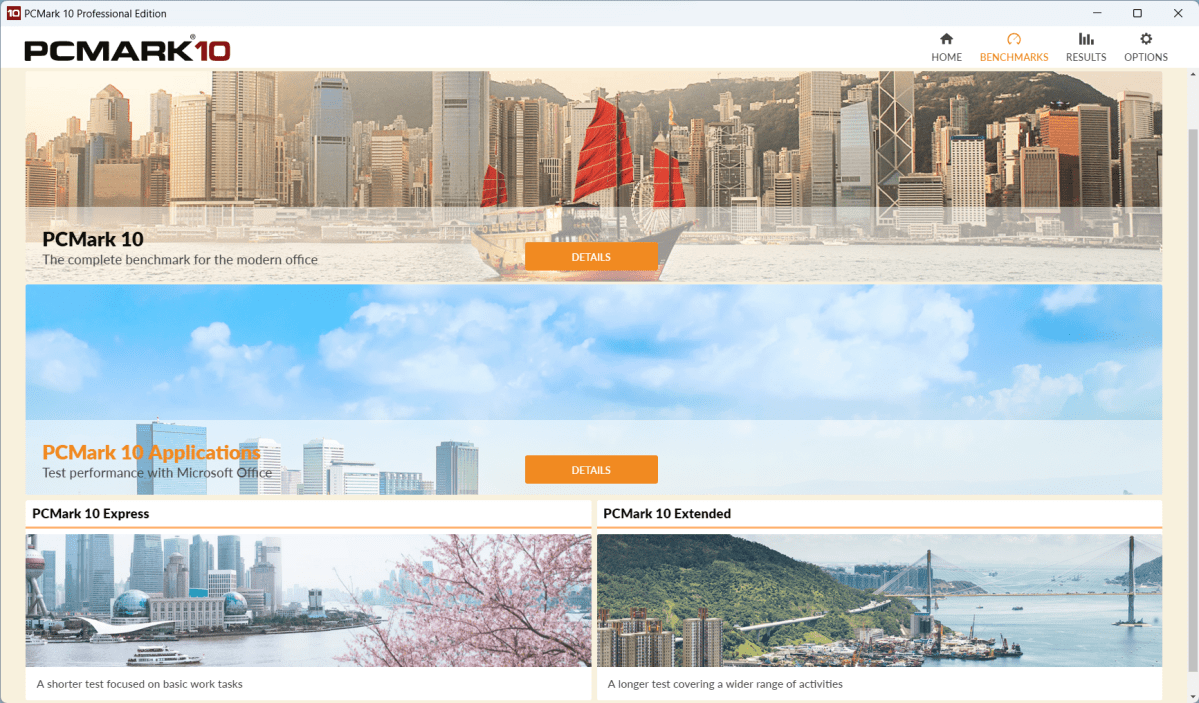
PCWorld
We run the benchmark before the security suite is installed. Then we install the software, have it run a full scan on our Windows 11 test machine, and start a second run of the benchmark at the same time. Then we compare the overall scores to see if the decline between the two benchmark runs is significant.
We repeat the same process using UL Procyon, which simulates document editing in Microsoft Office apps—e.g., Word, Excel, PowerPoint. Then, as the harshest stress test, we use Handbrake to transcode a video before and after installing the antivirus software. On many home PCs, this encoding task utilizes 100 percent of the CPU. We then compare transcoding times to see if there’s any significant decline.
Our test machine is an Acer Aspire 3 15 with an AMD Ryzen 5 7520U, 8GB RAM, and a 512GB SSD. Each security suite is tested on a clean install of Windows 10 Home.
As for the antivirus suite’s detection capabilities, we rely on the opinions of security researchers dedicated to this task. We take into consideration reports from outlets such as AV Comparatives and AV Test.
We also take pricing into account and what you get for it.
When possible, we review security suites using a free trial to get a sense of what consumers see when they first try out a new product.
Still have questions about our review process? You can get even more details (and the philosophy behind why we test as we do) in our full explanation about our antivirus testing practices.
FAQ
Is antivirus necessary in 2024?
Unfortunately, yes. Viruses, malware, and other online threats have only increased and become more sophisticated over time. Spending time on the internet or attaching any external drives to your computer without antivirus software is like going into battle without a stitch of armor.
Does Windows 10/11 need antivirus?
In the basic sense, absolutely yes—which is why Windows 10 and 11 come with in built-in antivirus protection. But while Windows Security performs well, the best third-party antivirus software have even higher rates of detecting threats. The top antivirus apps also offer more control over settings, detailed logs of your PC’s activity, a more user-friendly interface, and additional features to strengthen your online security beyond just viruses and malware. So strictly speaking, a Windows PC doesn’t need third-party antivirus software, but you can benefit from more comprehensive online protection. (Macs also need antivirus software.)
Will antivirus software slow down my computer?
The short answer is maybe, but probably not. Antivirus software scans files and programs to ensure there is no malware or other harmful threat present. The longer the time frame between each scan, the more files the program will need to check. These intensive scans may have some noticeable effect on your computer speed. It’s therefore recommended that you schedule your scans to run more frequently and/or at night so as to not impact your computer usage.
While antivirus software can affect the speed of your computer, it is most likely not the only factor—or even the most prominent. Other factors such as unnecessary startup and background programs, insufficient RAM, or even undiagnosed malware can have more drastic effects on your computer speed than a simple antivirus scan.
Should you pay for antivirus?
It depends on what antivirus features are most important to you. Do you just need a program that will scan, detect, and remove malware? Then go with a free version. But if you are looking for more advanced features such as the ability to block webcam hacking, run suspicious apps in a sandbox environment, and permanently delete sensitive files, then you should seriously consider upgrading to a paid premium antivirus service.
Overall, premium antivirus software is better suited to more complete coverage against threats—especially for inexperienced users. Children and seniors are particularly vulnerable to modern threats and therefore paid antivirus apps, which allow for multiple-device protection, may be a better option for families.
How many antivirus programs are recommended for one computer?
These days, most antivirus software are full suites. They take over completely for Windows’ built-in protection, and that single suite is all you need. More than that, and the different apps can start to conflict with one another. So no need to double up!
What should I do if my antivirus detects a threat?
In a perfect world, your antivirus software will halt and clean the infected files for you. However, this largely depends on which antivirus program you are using.
In general, the antivirus will send a warning to you and try to quarantine the infected file in order to keep it from spreading. Once isolated, the software will give you the option to try to remove the infection or delete the file altogether.
What is the difference between a full scan and a quick scan?
A full scan performs a comprehensive and thorough check of your whole system. It usually checks your system memory, startup programs, system backup, email databases, hard drives, and any removable storage drives.
A quick scan only checks a few areas including startup programs, system memory, and boot sectors. It may not detect all malware, but it can usually give you an idea if your computer has a virus.
As to when you should do either, we recommend a full scan once per week, during computer usage downtime (such as late at night). A quick scan can be done anytime you like, but it’s usually only necessary if you notice suspicious activity on your PC.
Do I need to update my antivirus software?
Absolutely! Keeping your antivirus software up-to-date is crucial in helping you to avoid the most recent threats.
That being said, most antivirus software today—whether free or paid—will default to automatic updates. This way you don’t need to worry about manually updating your software. It may still be worth checking to confirm that your antivirus is running the most up-to-date version from time to time.
What features should my antivirus software have?
Great question—especially since antivirus software continues to add more and more components to help keep you safe online. At absolute bare minimum, your app should have a scanner to protect against malware and online threats like phishing sites and a firewall. But other services like remote access protection, individual file encryption, and a password manager can be helpful too. Our breakdown of antivirus software features lays out the details you need to know, so that you can decide what you need.
This articles is written by : Fady Askharoun Samy Askharoun
All Rights Reserved to Amznusa www.amznusa.com
Why Amznusa?
AMZNUSA is a dynamic website that focuses on three primary categories: Technology, e-commerce and cryptocurrency news. It provides users with the latest updates and insights into online retail trends and the rapidly evolving world of digital currencies, helping visitors stay informed about both markets.
